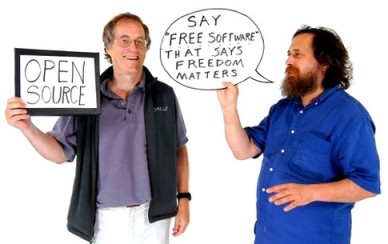
People often get confused when they think or are asked about Free Software and Open Source Software. They both sound the same, don’t they ? That’s the reason why these two terms are used interchangeably. But, there is a difference between the two.
To start with, Free Software distribution is done under the Free Software Movement, headed by the Free Software Foundation (an organization for fund-raising for GNU). Here, the source program can be distributed across different platforms, in its compiled form as well as in modified form. The source code can be used for studying, modifying and even redistributing the modified source code is permitted. It gives the user the freedom to use the program for any reason, as long as it is under General Public License (GPL). The modifications made by one author to the source code must also be made available to the community. Now once the program is “opened” to the community, it cannot be “closed”, until every author (including those who made even the slightest modification) provides his/her consent.
So, free software can be free for distribution purposes, but you can be charged for the source code. Sounds absurd, right ? Well, the vendor may give you liberties regarding the compiled program, but to have liberties for the source code, they can make you pay for it.
Open Source software, on the other hand, was a term that was coined in 1998, as a substitute for Free Software. The naivety of the media caused the public into believing that shareware, freeware and open-source software were all one and the same thing. While they were different terms.
Open Source Initiative (OSI) is an organization that exists to support the open source software movement. Under it, the source code as well as the compiled program is redistributable. Since, it does not have its own specific license, it allows companies to create their own licenses and have them certified by the OSI. Most of the companies which do not want their software to be released under the GPU license, go for the open source option.
Free Software foundation uses a specific license and provides softwares under that license.
OSI, on the other hand, reaches out for the support of company wanting to publish software under its very own license.
BSD, one such license approved by OSI, puts forwards conditions under which the source code may be made available to the user. If the source code is damaged, or used in an inappropriate manner, the author of the source code is well compensated.
While both Free Software distribution and the Open Source Initiative may differ in approach and ideologies, they are converging towards one common goal – providing free and open source software (FOSS).
